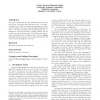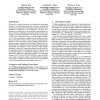SIGSOFT
2002
ACM
14 years 5 months ago
2002
ACM
Consider the execution of a failing program as a sequence of program states. Each state induces the following state, up to the failure. Which variables and values of a program sta...
SIGSOFT
2002
ACM
14 years 5 months ago
2002
ACM
This paper explores the idea that redundant operations, like type errors, commonly flag correctness errors. We experimentally test this idea by writing and applying four redundanc...
SIGSOFT
2002
ACM
14 years 5 months ago
2002
ACM
Security is a very important issue in information processing, especially in open network environments like the Internet. The Common Criteria (CC) is the standard requirements cata...
SIGSOFT
2002
ACM
14 years 5 months ago
2002
ACM
Scenario-based specifications such as Message Sequence Charts (MSCs) are popular for requirement elicitation and specification. MSCs describe two distinct aspects of a system: on ...
SIGSOFT
2002
ACM
14 years 5 months ago
2002
ACM
SIGSOFT
2002
ACM
14 years 5 months ago
2002
ACM
We propose a unifying framework for model-based specification notations. Our framework captures the execution semantics that are common among model-based notations, and leaves the...
SIGSOFT
2002
ACM
14 years 5 months ago
2002
ACM
Static checking can verify the absence of errors in a program, but often requires written annotations or specifications. As a result, static checking can be difficult to use effec...
SIGSOFT
2002
ACM
14 years 5 months ago
2002
ACM
Program slicing is a potentially useful analysis for aiding program understanding. However, slices of even small programs are often too large to be generally useful. Imprecise poi...


